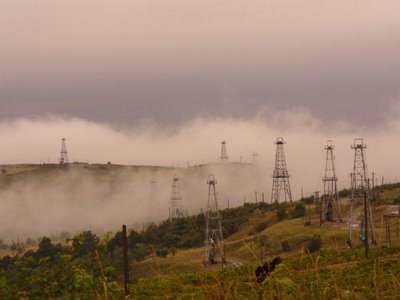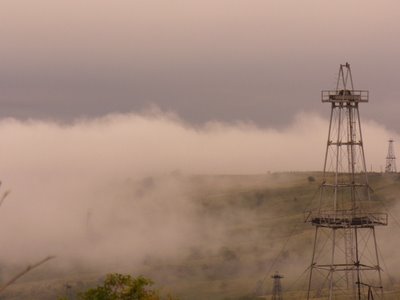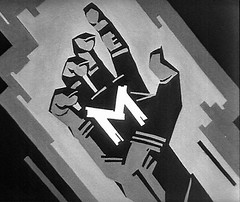And, as a snapshot, going again these days through the mapdesign part of mapmaking reminded me about an interesting post from Ben, who asks the question of cliché vs. crystal clear communication :D.
29 Sept 2006
blistering barnacles
And, as a snapshot, going again these days through the mapdesign part of mapmaking reminded me about an interesting post from Ben, who asks the question of cliché vs. crystal clear communication :D.
28 Sept 2006
family tree
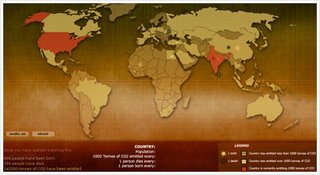 Marius gave me the link to Breathing Earth, a flash simulation which presents the carbon dioxide emission levels of every country in the world, as well as their birth and death rates. It reminded me about The Genographic Project developed by National Geographic and IBM, which is a five-year genetic anthropology study meant to "explore early human migration routes and describe the highlights along that journey", basically by analysing DNA samples. And which is one scientific project whose results i'm really dying to find out. Actually i was just thinking about it last week, when i saw yet another documentary about Ancient Egypt (about five years ago, i was more than fascinated by everything connected with egyptology) - this time, they were saying that DNA samples of contemporary egyptians were compared with DNA samples of ancient egyptians, in order to try and establish, once and for all, whether it was possible or not for the people who had built the pyramids to be aliens or something of the kind. Especially, since this latter supposition has kept on being claimed by all sorts of people. However, the result of the DNA comparison proved that aliens were quite out of questions among the pyramid workers, for the simple reason that the two types of DNA samples matched the very same population (actually, more than just this, it seems that the workers were quite surely free egyptians, not slaves, who came from all over the country to help raise the pyramids; anyway :D).
Marius gave me the link to Breathing Earth, a flash simulation which presents the carbon dioxide emission levels of every country in the world, as well as their birth and death rates. It reminded me about The Genographic Project developed by National Geographic and IBM, which is a five-year genetic anthropology study meant to "explore early human migration routes and describe the highlights along that journey", basically by analysing DNA samples. And which is one scientific project whose results i'm really dying to find out. Actually i was just thinking about it last week, when i saw yet another documentary about Ancient Egypt (about five years ago, i was more than fascinated by everything connected with egyptology) - this time, they were saying that DNA samples of contemporary egyptians were compared with DNA samples of ancient egyptians, in order to try and establish, once and for all, whether it was possible or not for the people who had built the pyramids to be aliens or something of the kind. Especially, since this latter supposition has kept on being claimed by all sorts of people. However, the result of the DNA comparison proved that aliens were quite out of questions among the pyramid workers, for the simple reason that the two types of DNA samples matched the very same population (actually, more than just this, it seems that the workers were quite surely free egyptians, not slaves, who came from all over the country to help raise the pyramids; anyway :D).snapshot
25 Sept 2006
the lesson of the five obstructions

although i promissed not to discuss movies on this blog anymore, i cannot help but recommend one which i considered to be brilliant. plus, it's not actually a movie, it is in fact a documentary, so...
19 Sept 2006
mehedinti: orsova


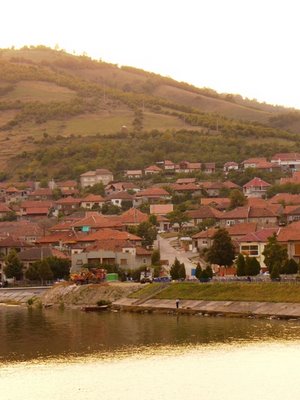 The locals are very friendly, despite the fact that the vast majority is unemployed. In fact, the intense lack of workplaces has determined most younger people to go either abroad to work, or go to Timisoara or Drobeta Turnu Severin for a change. Which means that the actual population of Orsova is a bit older and living a hard life, better said, trying and working hard to make a living. However, the crime rate is not at all high, as a friend of mine told me he'd expect it to be, and you can actually feel safe enough on the streets, even at night. The town is very quiet and relaxing, and seems almost deserted.
The locals are very friendly, despite the fact that the vast majority is unemployed. In fact, the intense lack of workplaces has determined most younger people to go either abroad to work, or go to Timisoara or Drobeta Turnu Severin for a change. Which means that the actual population of Orsova is a bit older and living a hard life, better said, trying and working hard to make a living. However, the crime rate is not at all high, as a friend of mine told me he'd expect it to be, and you can actually feel safe enough on the streets, even at night. The town is very quiet and relaxing, and seems almost deserted.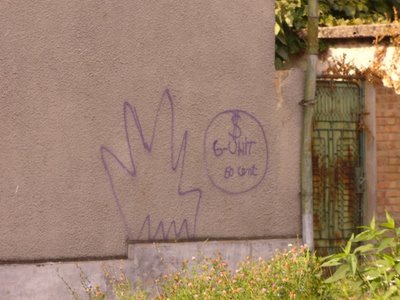
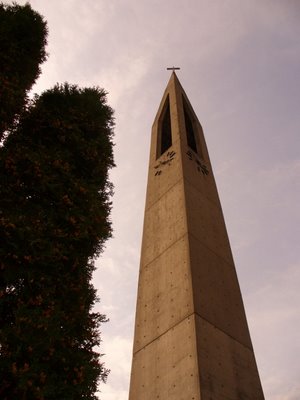 Another major problem in Orsova is the lack of a central heating system inside the city, which means that people gather and chop wood all day long. Even those living in blocks of flats.
Another major problem in Orsova is the lack of a central heating system inside the city, which means that people gather and chop wood all day long. Even those living in blocks of flats.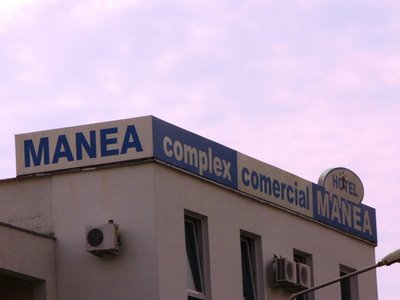 There's almost no evidence of tourism in the city, despite its great views and potential. The one hotel in the center of the city - Dierna (its name coming from the Roman name of the initial castrum) - is deserted, and although it's got a sign that says "renovation", people say they haven't seen or heard any move inside recently. Some say it was bought by an insurance company, who didn't do anything with it.
There's almost no evidence of tourism in the city, despite its great views and potential. The one hotel in the center of the city - Dierna (its name coming from the Roman name of the initial castrum) - is deserted, and although it's got a sign that says "renovation", people say they haven't seen or heard any move inside recently. Some say it was bought by an insurance company, who didn't do anything with it. 

The people i talked to resented Orsova being considered as part of Oltenia, and spoke really badly about those living in Oltenia in general. They liked to say, instead, that Orsova is part of Banat and were more than happy to tell me the entire story of their youth, deeply connected to Ada Kaleh. In fact, i noticed a similar attitude when i was in Suceava county. Those people couldn't stand being called Moldavians, and kept on repeating that they live in Bukovina, and have nothing to do with Moldovia.

The Ada Kaleh stories were indeed impressive, just like fairy tales of a fantasy land. Ada Kaleh was a small fortress island, populated by Turks, and situated on the Danube about 3 km away from Orsova. Apparently its whereabouts and sights were breathtaking, just like the quality and beauty of the products manufactured and sold on the island. People remember in great pain the moment when that small paradise, as they call it, was highjacked and disappeared in the Danube, as a consequence of the decision to build the Iron Gates hydroplant. But they also remember with great pleasure how they went to the bazaar or to dance on the island, and to taste the wonderful turkish lokum and other turkish delights, to lose themselves in the combination of charming smells on the island. One of the ladies was somewhat revolted: she doesn't know where young people have fun and enjoy life nowadays and how, cause she's sure she hasn't seen or heard anything like Ada Kaleh lately.
The more i was told, and the more i read about it, the more fascinated i become. And i can hardly wait to go back there and listen to other stories, maybe this time i'll also play with my camera a bit and bring back some videos with the people.
the napoleons - the second day
The second day with the Napoleons was just as charming as the first one – with presentations from Neil and Ben, but also with a lot of free talk and interventions from all of them.
Neil’s presentation basically focused on the wonderful principles and life of Wieden&Kennedy (the "we're here to do the best work of our lives" type of principles and life). Since he was kind enough and already posted his presentation, I’m not going to fill in other many pages with my notes. Mostly because he’s right: “they won’t make a great deal of sense if you weren’t there”. However, there’s one quote in particular from Dan Wieden, which I had read on welcome to optimism some time ago and which I was very happy to be reminded of - namely, “chaos does this amazing thing that order doesn’t: it engages you”.
Then, Ben played a sort of a talk-show host part, using his presentation on “The Future of Graphic Design (or advertising or creativity or anything)” as the basis of conversation for all four of them. The main points were:
1. Find inspiration in everything
-It was nice to hear interesting people discussing about interesting people, interesting meaning not necessarily friendly or something, but worth talking to, the kind of people who are so passionate about things, that they simply get you interested in what interests them, even via blogs.
2. Present passion, not Perfection
3. Create and understand content
-It’s so classy when people see an ad once, and then they are the ones who go find it and share it with others.
-Actually managing to get people involved – they develop their own ads, or better said, their own versions of your ads, they don’t just pass them along, but also think about them and play with them.
4. Understand your clients and their clients
5. Understand usability
6. Realise that design is the new management consultancy
-People like stuff, more than they like descriptions of stuff
-Very interesting points about creative research
- this should be something that people can look at and say: “I understand and it gives me ideas that are consistent with this”
- it can even be an object or something of the kind – an abject that makes sense and summarizes the research.
- a way of presenting research in a way that helps people be creative and come up with ideas
-Always try to do something, instead of only doing ads.
7. Remember that ideas will transcend stuff
- But ideas will not transcend, unless you make them into something
- Failure means not risking enough
Another important issue discussed was how important it is for planners to start learning how to edit video. In fact, they said something like anybody who knows to write in PowerPoint today should know how to edit video in 5 years. Which reminded me of a podcast in which Russell was saying something like one of the things that made him so great was that he learnt to put pictures in pp before others did.
Russell also talked a bit about blogs, saying things I was already really familiar with from his blog, such as:
- Not having a blog is like not having a phone
- A blog makes you take the “interesting” test
- Surrender control to win influence
- And, maybe among the most important characteristics, blogs teach you the skills of the future (including video-editing, which is so cool for a planner :D )
Then, further discussions followed, mostly about creative research, negative emotions, and even lifestyle and Eric Cantona. Lots of fun, also.
Another small detail that felt extremely relaxing for me was the very language the four guys used – they don’t use, abuse and overuse words like insights, consumers, brands and so on, concepts which seem to me so excessively used in our country. Well, that’s about it as far as my notes are concerned. As far as the great deal of thoughts that were inspired by these two days are concerned, however, I’ll most probably write yet other posts.
Covers on the matter i've read until now: Neil, Russell, Ben, Bogdana, Costin - also in pictures, Razvan, Claudiu here and here (it was great eventually meeting you in person, btw), Anca, Felipov
Pics soon.
18 Sept 2006
the napoleons - first flight
Yesterday when I left from the Athenaeum, after having listened to “The Napoleons” live in Bucharest, I had this line from “Lock, stock and two smoking barrels” in my mind: “it’s been emotional”. I was actually feeling absolutely amazing, and I can’t even remember the last time when hours had passed so quickly, without me even realizing it.
The Napoleons were Russell Davies (“the Mozart of planning”, as John Griffiths called him), Jeffre Jackson (an amazing planner, who’s now part of the OIA, after having worked for Goodby Silverstein and for Wieden&Kennedy Amsterdam), Ben Terrett (founder of The Design Conspiracy) and Neil Christie (managing director of Wieden&Kennedy London). These guys are brilliant and funny, which was not only obvious from the things they said, but also from the way they presented their ideas, their thoughts, their achievements. I simply did not get bored for a second, maybe for the very reason that they are that type of interesting people who simply get the others interested in whatever it is that it interests them, the kind of people more than worth listening to, talking to and most important learning from.
It feels really difficult to write about the stuff that I’ve learnt during these days, cause I didn’t mark down everything, being sure that most of it will find its way straight into practice. However, I’ll try to sketch some stuff I got out of the presentations.
Russell began his talk in his regular intriguing and pleasant manner, with an Archie Bell & The Drells song which sounded very much like the core of planning: “It’s up to me to come up with a strategy to make you mine [...], Girl, it’s up to you to do what I want you to, to ease my mind [...] There’s no need in teasing […], I need you and you need me”. Then he talked about metaphors. About the magic bullet, which is often used as a metaphor for the message produced; how different do apples and oranges look after they had been hit by a bullet, and how diverse are the reactions of people exposed to a certain message. About tennis balls - another metaphor commonly used to describe how messages should be, saying that if you throw one ball at a person, the person will catch it for sure, while if you throw three balls at a person, the person will catch none. Russell explained how he empirically proved himself the falsity of this assertion and used it as a pretext to show us some funny films that reminded us that people often pay attention to something only once they’re annoyed by it and that people will only watch what they want to watch. I particularly liked the one short which showed two persons in front of each other, one of them throwing one ball at the other one who would easily catch it; the whole process inspired me such boredom and childishness, that it was so obvious why Russell had always talked about the complexity of brands rather than their simplicity. Cause as he was further saying, people actually require complexity, they want depth, humour, subtlety, irony, anger, romance, drama, in other words, they want life and emotions – people don’t come out of cinemas saying: “I really enjoyed the movie. It was so clear”. Which also means that sometimes, good communication doesn’t even need a clear message expressed in clear words to get a brand through to people – we were shown the reactions of people in the street who were stopped and asked to watch a Nike rhythm ad: they danced, they got into the spirit, they even thanked Russell for showing them an ad, for Christ’s sake, in other words, they reacted to a type of communication which didn’t function via words/message.
There was another interesting point about how improper it is to use only words when talking about strategy and communication, and not take advantage of all types of non-verbal means: “writing about music is like dancing about architecture”.
In connection with all the above, there was this great idea that execution is strategic, but we never really talk about it. Which the more I think about, seems more and more true, especially in the context of creating non-verbal communication, so to say; and it is, indeed, one aspect of planning which seems to me less debated than the rest of planning roles. After all, just as Costin put it, planners should make sure that people get the right feeling about the brand, and execution is quite supposed to induce this right feeling(s). Moreover, a lousy execution can totally spoil all the long hours of hard thinking and work behind it. Just as it can totally mislead people about a brand.
Some more thoughts I marked down while discussing the Honda case study would be:
- One of the best briefs ever – a picture of a Honda’s back with Boring written on it instead of the model’s name
- If working on a brand which already has a slogan/tagline/etc, find out what it means and figure a way to express it (just like W&K did with “The Power of Dreams” and Leo Burnett did with Bergenbier’s “Prietenii stiu de ce – friends know why”)
- Writing adjectives about the brands you’re working with means getting more and more the right sense of those brands, but it also means finding conceptual enemies – which I think is yet another brilliant point (i.e., Honda ≠ complacency)
- Nike didn’t discover the power of advertising, Nike discovered the power of its own voice – be surprising every time you talk to people, have an actual impact
- While working for Honda, Wiedens used to stick on walls all sorts of things, leave stuck on the walls whatever felt right for the brand, and rip off whatever didn’t feel just as right – actually the very process helped them figure out what actually felt right for Honda, and ended up with “The Book of Dreams”. But the book is not the point. The process is the point.
- “isn’t it nice when things just work?” – feeling, not message.
- Nobody talks about negative emotions in advertising – is that stupid or what in a world in which life is full of negative emotions?
Russell ended his first part saying something “and then I became a client and realized all that was bollocks”, which made him talk a bit about organizational needs versus communication needs.
Jeffre Jackson was next with a presentation fairly self-explanatorily entitled “Sell!”, whose starting point was that everything must be sold – in the right way, to the right people. The presentation was a real thrill, cause Jeffre is a real thrill. He gave us several general principles for selling, such as:
- Separate the idea from the execution
- Tell them what you’re gonna tell them. Tell them. Tell them what you’re just told them.
- Give them the tools to sell internally.
And he gave us lots of tips, among which:
- First sell idea, then execution
- Idea sheet
- Shared language
- Insist on tissue sessions
- Deliver a “sales pack” along with the work – by the way, think about the lives of clients and always remember that clients have their own clients
- Don’t skimp on the “other” ideas – like focus on all details and all requirements, not just TV and print, but also think about billboards, packaging etc
- Report every significant step between brief and solution. Even the dead ends. – help the relationship with the client, build more and more confidence, explain what you think doesn’t work and why and so on.
- Refer to client research when you can – make friends with their research director
- understand and communicate what the client wants (not just what’s on the brief)
- cultivate many sources of information
- arrange a client-agency outing
- adapt. Don’t give up.
- Have the right people explain clients the work (have art directors explain the technical details – they’ll make their choices clearer for the clients)
- Passion is better than perfection.
Oh…and yet another thing I totally loved was the emphasis on facts such as that great agencies just work harder and that the grass in not greener on the other side of the fence – there is no actual “out there”.
The really funny game we played taught us once again that kindergarten children are the greatest, cause they ask for more, they make more attempts, they learn by doing, work in parallel, embrace failure, as well as multiple iterations.
The open discussions that followed were very catchy and focused on how to keep people inspired, how to fire clients, how to manage the tension between smaller and larger agencies working on an account, “not the best idea wins, the best explained idea wins”, and, very important – decide what kind of business you want to be in.
After which along came Ben Terrett, from “The Design Conspiracy”, another small fantastic gathering of a great bunch of folks, whose aim is to “create intrigue and provoke reaction”. Even through their heat-sensitive business cards. And through their free company fruit policy. As well as through their “finish at 4 PM Friday” policy. And their giving to charity more than 1% of their gains each year. Or their bonuses on employer’s birthday. And so on – great presentation, great ideas, great time.
I can’t believe how much I’ve written – guess it’s just part of the enthusiasm. The truth is that even if I knew about most of the things I’ve marked down, it still felt great to hear those guys talking about them. Hopefully, the post on the second day will be shorter :D. Huge thanks to the Napoleons and huge thanks to you, Bogdana ! :)
11 Sept 2006
3 Sept 2006
wandering around

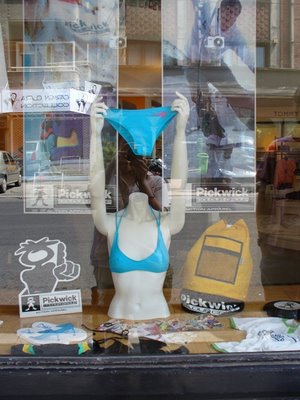 yesterday i went to the cinema after a very long time. we went to Cinema Pro and saw "Margo", since Andrei was so willing to give yet another chance to Romanian movie-making and i was so willing to give Cinema Pro another chance. And they have this promo: if you buy two tickets, you get one for free. So we got one for free. So did a group of five other people. Since we didn't have what to do with them, we thought we might give the two spare tickets to the first two persons who come. Two persons came, we offered the tickets. Not only did they refuse to believe us and the promotional poster, but they refused our offer strongly, for fear we were trying to give them something which wouldn't have allowed them to get in. Maybe even get them into trouble. I'm still not sure it was paranoia, but such a lack of openess left a bitter taste. Aren't you even supposed to consider doing any good in this city anymore ?
yesterday i went to the cinema after a very long time. we went to Cinema Pro and saw "Margo", since Andrei was so willing to give yet another chance to Romanian movie-making and i was so willing to give Cinema Pro another chance. And they have this promo: if you buy two tickets, you get one for free. So we got one for free. So did a group of five other people. Since we didn't have what to do with them, we thought we might give the two spare tickets to the first two persons who come. Two persons came, we offered the tickets. Not only did they refuse to believe us and the promotional poster, but they refused our offer strongly, for fear we were trying to give them something which wouldn't have allowed them to get in. Maybe even get them into trouble. I'm still not sure it was paranoia, but such a lack of openess left a bitter taste. Aren't you even supposed to consider doing any good in this city anymore ? 
